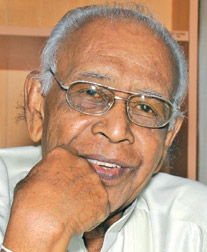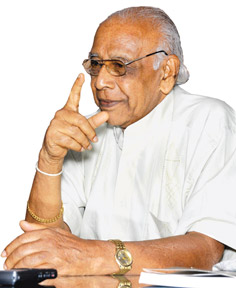Seeking novetly in the novel
Sajitha PREMATUNGE

They say creative writing cannot be taught, some would go so far as
to say it cannot even be acquired. But this writer only needed a jolt of
inspiration. It is indeed strange that a Sinhala writer had to go all
the way to Iowa, USA to be inspired to write.
|
 |
|
Prof A V Suraweera’s
works of fiction
Pedidiyata Boradiya (1970)
Heiyanmaruwa (1971)
Goduru Loba (1973)
Noyan Putuni Gama Harada (1975)
Atta Bindei Paya Burulen (1977)
Sada Melesa Pura Derane (1980)
Andura Duralana Res (1984)
Bhawathimira (1984)
Miniskama ha Rajakama (1998)
The Inescapable Swamp: Selected Stories
Bale Patan Kalaya Gevuna Melese
The Faithful Wife of a Politician
Thus the City was Built (1999) |
 |
|
Prof A V Suraweera. Pictures by Saman
Sri Wedage |
But Prof Alankarage Victor Suraweera’s sabbatical leave in 1967 was
spent most productively when he took a creative writing course at the
Iowa University that literally changed his life. His debut short story
collection, Katath Ma Epa Wela was a direct result of this experience.
“The writer must be the first critic of his or her own writing. Once
a writer finishes the first draft, he or she should return to it as a
critic and examine the writing in a critical perspective,” says Daily
News Artscope’s next encounter, Prof A V Suraweera.
He does his creative work in Sinhala and his critical works in both
Sinhala and English. Now he is five novels and four short story
collections strong. No two stories are alike. He introduced to Sri
Lankan literature two disciplines hitherto unexplored - sociology of
literature and editing of classical texts.
He completed a number of editions based on Ola manuscripts, such as
Rajavaliya, Poojavaliya and Thisara Sandeshaya.
Lekhana Sameeksha, an examination of writing in Sri Lanka, which will
be out in a few days is guaranteed to have ‘many surprises’ for the
reader. “It focuses on areas that no other writer has dealt with,” says
Prof A V Suraweera.
Q: Why have you not done any creative writing in English?
A: I write in the language I am most familiar with and then
translate my own work into English.
Q: You have not engaged in creative writing for quite some
time, are you suffering from writers’ block?
A: A good writer has to be inspired to write. I haven’t felt a
creative urge to write lately. But I have been engaged in other literary
work.
Q: Where does Sinhala writing stand today, the novel in
particular?
A: The heyday of the Sinhala novel is long gone. Sinhala
writing today is largely substandard. The modern generation of Sinhala
writers churn up two to three substandard novels a year. We have novels
coming out of the woodworks. Modern writers have no respect for their
craft. Most Sinhala writing today is targeted at securing awards which
as substandard as the writing it judges.
Q: Why is Sinhala writing substandard?
A: The so-called writers today, lack a few prerequisites of a
writer. They are not familiar with either the classical Sinhala texts or
modern world writing through English.
Sri Lanka has a very rich literary tradition. In fact very few other
literary cultures possess such a rich tradition. Writers such as Martin
Wickramasinghe and Piyadasa Sirisena possessed this knowledge. Simply
put, this new generation of ‘writers’ are not well-read.
Another prerequisite is the mastering of the language. It does not
mean conforming to grammar. Language of fiction has to be creative but
refined at the same time. Only such books can stand the test of time.
Some of the modern Sinhala fiction today makes liberal use of what I
refer to as the ‘gutter language’.
Moreover modern writers are not rooted in our cultural background. In
fact some are quite oblivious to it.
Q: Writing a short story is more difficult than writing a
novel, would you agree?
A: Yes and no. They are two different genres employing
different techniques and therefore difficult to compare.
However a short story is forced to be selective in terms of plot and
other characteristics due to space constraints. It cannot entertain
irrelevant material, everything has to reflect the theme. A novel has
greater scope.
Q: What influenced the Sinhala short story, Western literature
or Jathaka Stories?
A: Martin Wickramasinghe was for the latter. Jathaka Stories
certainly had some influence over the Sinhala short story in it that
they were stories themselves. However the short story and the novel for
that matter are Western literary concepts.
Q: Why has a tradition of literary criticism not evolved in
Sri Lanka?
A: Readership, literature and literary criticism are
interlinked. One cannot thrive without the other. For a tradition of
literary criticism to evolve, it requires rich literature as well as a
mature reading public. We have none of these.
The average reader is generally immature and has bad taste in
literature.
Our critical literary went down hill from the 1970’s. The education
system is a primary cause for this deterioration. The Sri Lankan
education system is exam oriented. Although we are busy talking about a
knowledge oriented society we are not striving to build one.
Q: What form of literary criticism can be applied to Sinhala
literature?
A: No one can pinpoint what literary theory can be applied to
Sinhala literature. Literature of any country has to have its own
identity.
It is this identity that separates Sri Lankan literature from
English, American, African, French or Russian literature. We have lost
our identity, instead we talk of the influence of Western literature.
This is why Martin Wickramasinghe emphasised on a Buddhist
rationalist literary theory, in his Sinhala Vichara Maga. Neither our
literature nor literary theory require foreign models, we have an
identity of our own.
Q: What are the characteristics of an ideal critic?
A: The ideal critic has to be familiar with literary theories.
He has to be well read and unbiased.
Q: A Writer has to expose the truth at the risk of negative
criticism, please comment.
A: This is one of the major functions of a writer.
A society cannot understand itself, it is the duty of a writer to
point out its shortcomings in an outsider’s perspective.
But unfortunately this is what is lacking today. Our writers are too
eager to please, there is little social commentary in modern literature.
Q: How does a writer’s social background affect his or her creative
pursuits?
A: A writer cannot function without his socio cultural background. A
writer is a product of the society. Everything about a writer is moulded
by his social setting. This is why a writer cannot tackle a society
totally alien to him.
This is what I deal with in the book Samajeeya Sahithya Adyanaya, I
wrote on my return from reading sociology of literature at the
University of Kent, Canterbury.
Q: How can a writer use social observation in creative
writing?
A: It is a fine line between fact and fiction. In any work of
literature there is a certain amount of fact.
Whether it is a writer’s personal experience or social observation,
it invariably seeps into his writing.
But this truth is usually manipulated into fiction. How far a writer
can make use of social observation depends on his or her skill.
Q: You have taught creative writing and wrote ‘Nawakatha
Nirmanaya ha Awabodaya’. Can creative writing really be taught and/or
acquired?
A: Yes and no. One can teach how to enhance creative talents,
not to write.
If you don’t have talent, it can certainly be acquired if you have
the will. This is what is taught in creative writing programmes, how to
acquire talent.
Q: There is a dearth of conflict literature in English in Sri
Lanka. Is it the same for Sinhala literature?
A: The body of conflict literature is rather small compared to
the time span of the war.
Only recently have certain writers started to focus on the subject,
but these works are still at the elementary stage. Perhaps the writers
were not directly affected by the conflict.
Q: Some Sinhala writers, including you, to some extent, are
synonymous with village-well literature. Alienated Sri Lankan English
writers resorted to this in an attempt reconnect with the village. Why
did Sinhala writers romanticise the village?
A: In my defence, I did not limit my subject matter to village
life, I only started off with it. The accounts of village life by Sri
Lankan English writers did not ring true because they belonged to the
Colombo community. However Sinhala writers tended to romanticise the
village, because most of them were originally from the village.
Q: In ‘Atta Bindei Paya Burulen’ you discuss the hypocrisy of
university lecturers. Is this a result of your personal experiences as a
lecturer? A:Yes. In fact the hypocrisy is now more acute. The
main function of a teacher is to teach, then conduct research. These are
hardly fulfilled. The situation of research in Sri Lankan universities
is pathetic.
Q: It is apparent from ‘Katath Ma Epa Wela’ that you like to
analyse the human psyche, what is the special interest? A:No special
interest. I wanted to give something new to the reader each time. There
is a certain amount of personal experience in the story, in it that it
is based on a personal observation.
Q: In ‘Pedidiyata Boradiya’, you used colloquial language in
dialogue and written language in the narration. Why?
A: For the sake of novelty. Dialogue is what people speak.
This iswhy I used the language of the people in the dialogues. However
even in the dialogue, selective language is used.
Q:You are known for inventing Sinhala words for English words.
Doesn’t this reduce the quality of Sinhala?
A:On the contrary, this enriches the Sinhala language. Most
post modernist writers, in books or other medium, attempt to explain
English words in Sinhala and failing that gives the original English
word within brackets. This way you understand neither Sinhala nor
English. It is better to invent Sinhala words for English words, instead
of substituting them with the English counter part.
Q:According to surveys conducted by the National Education
Commission, most school children cannot write proper Sinhala. In this
light what is your comment on the current English oriented education?
Would this inhibit the Sinhala creative ability of Sri Lankan children?
A:There is a craze for English today. They think that a bit of
English would take you a long way in life. This is one of the reasons
for parents to send their children to international schools. Moreover
the education system being exam oriented, there is hardly any focus on
creative writing. This English oriented education would definitely
affect the creative abilities of school children, irrespective of the
medium.
Most school children cannot write proper Sinhala. Their English, for
that matter, is not good either. They can speak but cannot write.
Consequently they are incompetent in both languages.
|



